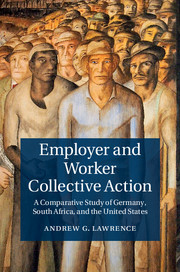Employer and Worker Collective Action A Comparative Study of Germany, South Africa, and the United States
Langue : Anglais
Auteur : Lawrence Andrew G.

This book compares sources of worker and employer power in Germany, South Africa, and the United States.
This book compares sources of worker and employer power in Germany, South Africa, and the United States in order to identify the sources of comparative US decline in union power and to more precisely analyze the nature of labor-movement power. It finds that this power is not confined to allied parties, union confederations, or strikes, but rather consists of the capacity to autonomously translate power from one context to the next. By combining their product, labor market, and labor law advantages through their dominant employers' associations, leading firms are able to impose constraints on labor's free collective bargaining regionally and nationally, defeating employer interests that are more amenable to labor in the process. Through an examination of these patterns of interest organization, the book shows, however, that initial employer advantages prove to be contingent and unstable and that employers are forced to cede to more far-reaching demands of increasingly organized workers.
Part I. Power in Theory and Context: 1. Contending theories of labor power; 2. Contextualizing workers' power; Part II. Employer Strategy and Collective Action: 3. Varieties of firm strategy: monopolization, cartelization, and concentration; 4. Varieties of employer associations: origins, development, and divergence; Part III. Workers: Outlaws, in the Law and by the Law: 5. Failed incorporation and union response; 6. Varieties of juridification; Part IV. From Postwar Golden Quarter Century to Post-Cold War Interlude: 7. The golden quarter century: revival, containment, or decline?; 8. Union and employer relations after the golden quarter century; Part V. Collective Action before and in the Global Economic Crisis: 9. From tripartism to global crisis; 10. Conclusion: doing the work of crisis without crisis?
Andrew G. Lawrence taught for several years in the Woodrow Wilson Department of Politics at the University of Virginia and in the School of Social and Political Science at the University of Edinburgh, where he also served as postgraduate director of African studies. He has also held the positions of visiting lecturer and scholar in the department of study and research into African and Arab countries at the 'Orientale' University of Naples in Italy and the school of politics and social sciences at the European University Institute, Fiesole, Italy. He has written articles published in Comparative Politics, the Journal of Development Studies, Public Policy Research, and New Political Science and was awarded the Anthony Styskal, David Spitz, Ivo Duchacek, and Dankwart A. Rustow Democratization and Civil Society fellowships from the City University of New York Graduate Center, as well as the DAAD and Friedrich Ebert research fellowships.
Date de parution : 08-2014
Ouvrage de 360 p.
15.7x23.6 cm
Disponible chez l'éditeur (délai d'approvisionnement : 14 jours).
Prix indicatif 102,80 €
Ajouter au panierThème d’Employer and Worker Collective Action :
© 2024 LAVOISIER S.A.S.


